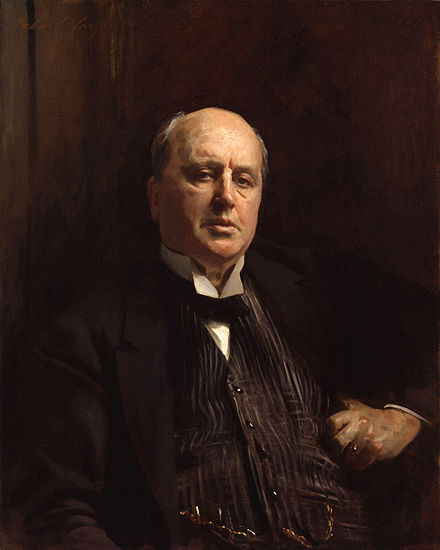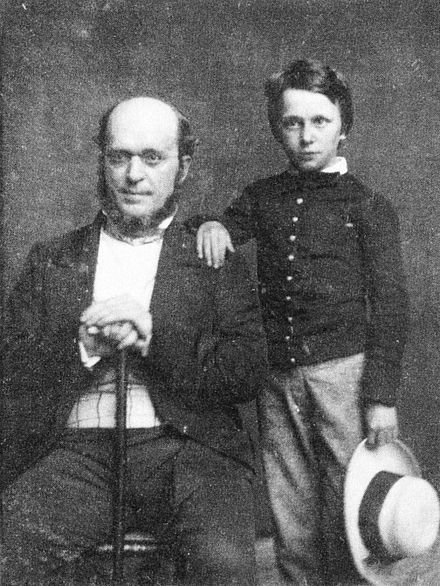|
Henry James OM (15 April 1843 – 28 February 1916) was an American author. He is regarded as a key transitional figure between literary realism and literary modernism, and is considered by many to be among the greatest novelists in the English language. He was the son of Henry James Sr. and the brother of renowned philosopher and psychologist William James and diarist Alice James. Born in the United States, James largely relocated to Europe as a young man, and eventually settled in England, becoming a British citizen in 1915, a year before his death. James was nominated for the Nobel Prize in Literature in 1911, 1912, and 1916. He is best known for a number of novels dealing with the social and marital interplay between émigré Americans, English people, and continental Europeans. Examples of such novels include The Portrait of a Lady, The Ambassadors, and The Wings of the Dove. His later works were increasingly experimental. In describing the internal states of mind and social dynamics of his characters, James often made use of a style in which ambiguous or contradictory motives and impressions were overlaid or juxtaposed in the discussion of a character's psyche. For their unique ambiguity, as well as for other aspects of their composition, his late works have been compared to impressionist painting. His novella The Turn of the Screw has garnered a reputation as the most analysed and ambiguous ghost story in the English language, and remains his most widely adapted work in other media. He also wrote a number of other highly regarded ghost stories, and is considered one of the greatest masters of the field. James published articles and books of criticism, travel, biography, autobiography, and plays. BiographyHenry James was born at 21 Washington Place in New York City on 15 April 1843. Both of his parents were of Irish and Scottish descent. His father Henry James, Sr. was intelligent and steadfastly congenial, a lecturer and philosopher who had inherited independent means from his father, an Albany banker and investor. His mother Mary Walsh came from a wealthy family long settled in New York City. Henry James had three brothers and one sister. Before he was a year old, his father sold the house at Washington Place and took the family to Europe, where they lived for a time in England. The family returned to New York in 1845, and Henry spent much of his childhood living between his paternal grandmother's home in Albany, and a house on 14th Street in Manhattan. His education was calculated by his father to expose him to many influences, primarily scientific and philosophical. Between 1855 and 1860, the James household travelled to London, Paris, Geneva, Boulogne-sur-Mer, and Newport, Rhode Island, according to the father's current interests and publishing ventures, retreating to the United States when funds were low. Henry studied primarily with tutors, and briefly attended schools while the family travelled in Europe. Their longest stays were in France, where Henry began to feel at home and became fluent in French. He had a stutter, which seems to have manifested itself only when he spoke English; in French, he did not stutter. In 1860, the family returned to Newport. There, Henry became a friend of painter John La Farge, who introduced him to French literature, and in particular, to Balzac. James later called Balzac his "greatest master", and said that he had learned more about the craft of fiction from him than from anyone else. In 1862, Henry attended Harvard Law School, but realised that he was not interested in studying law. He pursued his interest in literature and formed lifelong friendships with Oliver Wendell Holmes Jr., the future Supreme Court justice, and with James T. Fields and Annie Adams Fields, his first professional mentors. His first published work was a review of a stage performance, "Miss Maggie Mitchell in Fanchon the Cricket," published in 1863. About a year later, "A Tragedy of Error", his first short story, was published anonymously. In 1869, he settled in London, where he established relationships with Macmillan and other publishers, who paid for serial installments that they published in book form. The audience for these serialized novels was largely made up of middle-class women, and James struggled to fashion serious literary work within the strictures imposed by editors' and publishers' notions of what was suitable for young women to read. He lived in rented rooms, but was able to join gentlemen's clubs that had libraries and where he could entertain male friends. He was introduced to English society by Henry Adams and Charles Milnes Gaskell, the latter introducing him to the Travellers' and the Reform Clubs. During a 14-month trip through Europe in 1869–70, he met John Ruskin, Charles Dickens, Matthew Arnold, William Morris, and George Eliot. Rome impressed him profoundly. He attempted to support himself as a freelance writer in Rome, When his effort failed, he returned to New York City. In 1871, he published his first novel, Watch and Ward, in serial form in the Atlantic Monthly. The novel was later published in book form in 1878. During 1874 and 1875, he published Transatlantic Sketches, A Passionate Pilgrim, and Roderick Hudson. During this early period in his career, he was influenced by Nathaniel Hawthorne. In the fall of 1875, he moved to the Latin Quarter of Paris, where he met Zola, Daudet, Maupassant, Turgenev, and others. He stayed in Paris for only a year before moving to London. Aside from two trips to America, he spent the next three decades—the rest of his life—in Europe. While living in London, James continued to follow the careers of the French realists, Émile Zola in particular. Their stylistic methods influenced his own work in the years to come. Hawthorne's influence on him faded during this period, replaced by George Eliot and Ivan Turgenev. In England, he met the leading figures of politics and culture. In the first few years he published The American (1877), The Europeans (1878), a revision of Watch and Ward (1878), French Poets and Novelists (1878), Hawthorne (1879), and several shorter works of fiction. In 1878, Daisy Miller established his fame on both sides of the Atlantic. He also began his first masterpiece, The Portrait of a Lady, which appeared in 1881. The period from 1882 to 1883 was marked by several losses. His mother died in January 1882, while James was in Washington, DC, on an extended visit to America. He returned to his parents' home in Cambridge, where he was together with all four of his siblings for the first time in 15 years. He returned to Europe in mid-1882, but was back in America by the end of the year following the death of his father. Emerson, an old family friend, died in 1882. His brother Wilkie and friend Turgenev both died in 1883. In 1884, James made another visit to Paris, where he met again with Zola, Daudet, and Goncourt. In 1886, he published The Bostonians and The Princess Casamassima, both influenced by the French writers he had studied assiduously. During this time, he became friends with Robert Louis Stevenson, John Singer Sargent, Edmund Gosse, George du Maurier, Paul Bourget, and Constance Fenimore Woolson. His third novel from the 1880s was The Tragic Muse. Although he was following the precepts of Zola in his novels of the '80s, their tone and attitude are closer to the fiction of Alphonse Daudet. The lack of critical and financial success for his novels during this period led him to try writing for the theatre. After the stage failure of Guy Domville in 1895, James was near despair and thoughts of death plagued him. His depression was compounded by the deaths of those closest to him, including his sister Alice in 1892; his friend Wolcott Balestier in 1891; and Stevenson and Fenimore Woolson in 1894. The sudden death of Fenimore Woolson in January 1894, and the speculations of suicide surrounding her death, were particularly painful for him. In 1897–1898, he moved to Rye, Sussex and wrote The Turn of the Screw; 1899–1900 had the publication of The Awkward Age and The Sacred Fount. During 1902–1904, he wrote The Ambassadors, The Wings of the Dove, and The Golden Bowl.
In 1904, he revisited America and lectured on Balzac. In 1906–1910, he published The American Scene and edited the "New York Edition", a 24-volume collection of his works. In 1910, his brother William died. In 1913, he wrote his autobiographies, A Small Boy and Others, and Notes of a Son and Brother. In 1915, he became a British citizen and was awarded the Order of Merit the following year. He died on 28 February 1916, in Chelsea, London, and was cremated at Golders Green Crematorium. As he requested, his ashes were buried in Cambridge Cemetery in Massachusetts.
0 Comments
Leave a Reply. |
Categories
All
Archives
December 2023
|

